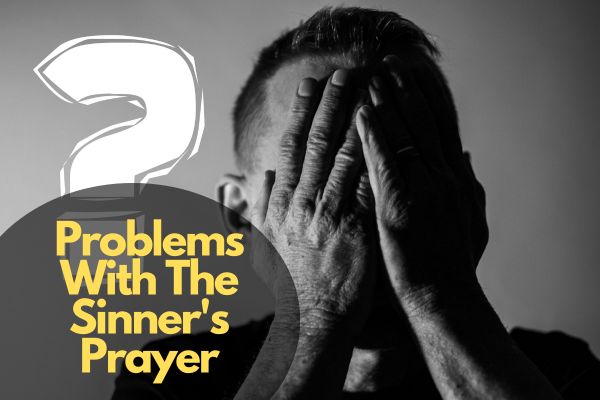Table of Contents Show
The Sinner’s Prayer, a widely practiced ritual in Christianity, has sparked intense debates within the religious community. While it holds significant spiritual importance for many, it’s not without its share of controversies. Explore the intricate problems associated with the Sinner’s Prayer, understand its controversies, and address common questions. Learn more about this spiritual practice and its challenges.
Problems With The Sinner’s Prayer
In the realm of religious practices, the Sinner’s Prayer has been a topic of intense debate and scrutiny. In this comprehensive article, we will dissect the various problems associated with the Sinner’s Prayer, shedding light on its complexities and addressing widespread concerns.
What is the Sinner’s Prayer?
Before delving into the problems, it’s crucial to understand what the Sinner’s Prayer entails. This widely recognized evangelical Christian practice involves repentant sinners praying to God, acknowledging their sins, seeking forgiveness, and accepting Jesus Christ as their Lord and Savior.
Lack of Biblical Basis
Critics often challenge the Sinner’s Prayer due to its lack of explicit mention in the Bible. This absence raises questions about its authenticity as a genuine religious practice. Believers and theologians grapple with reconciling tradition with biblical authority. One of the primary concerns raised by critics is the absence of a concrete biblical foundation for the Sinner’s Prayer.
Superficial Conversion
Christian denominations vary in their interpretations of the Sinner’s Prayer. Theological disparities emerge regarding whether the prayer ensures salvation or if it merely serves as a symbolic gesture. These differences often lead to division and confusion among believers. Critics contend that the Sinner’s Prayer can lead to superficial conversions, where individuals might recite the prayer without genuinely understanding its significance. This raises doubts about the authenticity of one’s faith and spiritual transformation.
Assurance vs. Repentance
A significant dilemma associated with the Sinner’s Prayer is the assurance it provides. Some argue that individuals who recite the prayer might develop a false sense of assurance about their salvation, potentially hindering genuine repentance and spiritual growth.
Cultural and Linguistic Variations
Another challenge stems from the cultural and linguistic differences across regions. The Sinner’s Prayer might not resonate universally, leading to misunderstandings and misinterpretations among diverse communities.
Theological Discrepancies
The theological underpinnings of the Sinner’s Prayer have been a subject of theological debate. Different Christian denominations interpret the prayer differently, leading to theological discrepancies that further complicate its understanding and practice.
Is the Sinner’s Prayer Essential for Salvation?
The question of whether the Sinner’s Prayer is a prerequisite for salvation remains contentious. While some believe it is necessary, others argue that genuine repentance and faith in Christ are the core elements of salvation, regardless of reciting a specific prayer.
Can Sincerity Compensate for Ritual?
This raises a fundamental question: can sincerity compensate for the ritualistic recitation of the Sinner’s Prayer? Some argue that a sincere heart matters more than the specific words spoken, emphasizing the need for a genuine connection with God.
How Do Different Christian Denominations View the Sinner’s Prayer?
Christian denominations have diverse perspectives on the Sinner’s Prayer, leading to varied practices and beliefs. Understanding these differences is essential in appreciating the broader landscape of this spiritual practice.
Is There a Universal Alternative?
Amidst the concerns surrounding the Sinner’s Prayer, some individuals seek a universal alternative for salvation. Exploring various theological perspectives and alternative approaches is crucial in addressing the dilemmas associated with this practice.
What Role Does Personal Faith Play?
Ultimately, the role of personal faith in the context of the Sinner’s Prayer cannot be ignored. It is essential to contemplate the significance of an individual’s faith journey and how it intertwines with this spiritual practice.
Conclusion
In conclusion, the problems associated with the Sinner’s Prayer underline the intricate nature of religious beliefs and practices. Engaging in open dialogue, respecting diverse interpretations, and fostering understanding within the religious community are essential steps toward harmonizing these differences.
As believers navigate these challenges, embracing empathy and tolerance can pave the way for spiritual growth and unity.
Frequently Asked Questions
Q: Is the Sinner’s Prayer mentioned explicitly in the Bible?
A: No, the Sinner’s Prayer is not explicitly mentioned in the Bible, leading to debates about its authenticity.
Q: Can sincerity compensate for the ritualistic recitation of the Sinner’s Prayer?
A: Many argue that sincerity and genuine repentance are paramount, regardless of the specific words spoken.
Q: How do different Christian denominations view the Sinner’s Prayer?
A: Christian denominations have diverse perspectives, leading to varied practices and beliefs regarding the Sinner’s Prayer.
Q: Is there a universal alternative to the Sinner’s Prayer for salvation?
A: The search for a universal alternative continues, with various theological perspectives and alternative approaches being explored.








